
Overview
The article asserts that DTC (direct-to-consumer) brands must strategically compare and select digital marketing firms to significantly enhance their success. It highlights the critical need for evaluating firms based on:
- Their proven experience with DTC brands
- The comprehensive range of services offered—especially in Conversion Rate Optimization
- The capability to deliver data-driven, customized solutions that address the unique challenges and objectives of these brands
By doing so, firms can effectively support the growth and profitability of DTC brands in an increasingly competitive landscape.
Introduction
Digital marketing firms are indispensable to the success of direct-to-consumer (DTC) brands, delivering essential services that amplify online visibility and foster customer engagement. As DTC brands confront challenges like elevated customer acquisition costs and suboptimal conversion rates, choosing the right marketing partner becomes critical.
How can these companies effectively assess and compare digital marketing firms to ensure alignment with their distinct needs and growth ambitions? This article explores the criteria for evaluating digital marketing agencies, providing insights that empower DTC brands to make informed decisions, paving the way for sustainable success.
Understanding Digital Marketing Firms: Roles and Services
Digital marketing firms are pivotal to the success of DTC labels, offering a range of services designed to enhance online visibility, engagement, and conversion rates. These essential services include:
- Search Engine Optimization (SEO): Elevating website visibility on search engines to attract organic traffic.
- Pay-Per-Click Advertising (PPC): Overseeing paid advertising campaigns to drive targeted traffic effectively.
- Social Media Marketing: Engaging with customers on social platforms to cultivate loyalty and brand awareness.
- Content Marketing: Developing valuable content to attract and retain a clearly defined audience.
- [Conversion Rate Optimization (CRO)](https://parahgroup.com): Implementing strategies to boost the percentage of visitors who complete desired actions on a website.
Understanding these roles empowers DTC companies to identify which services align with their and challenges.
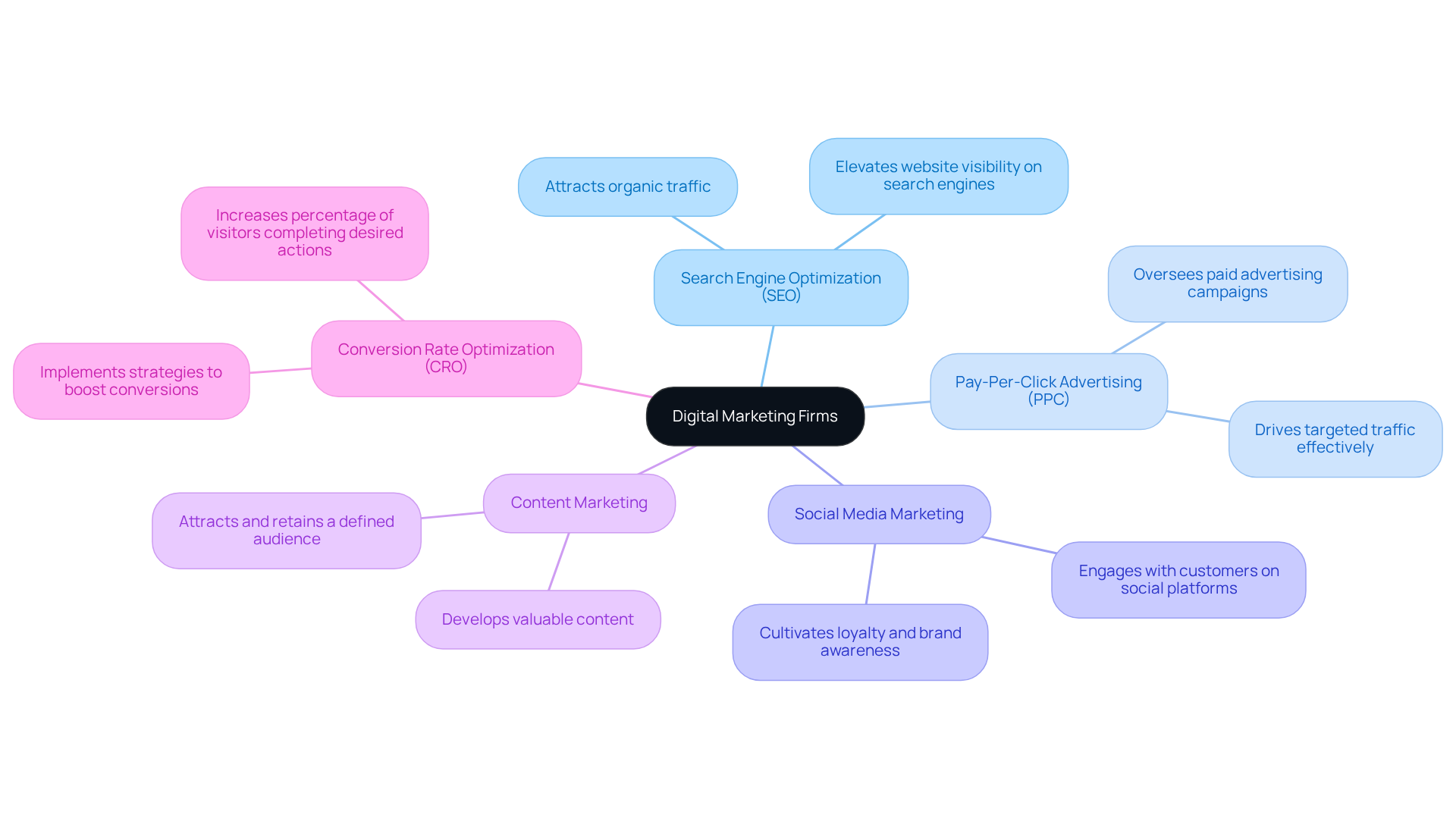
Identifying DTC Brand Needs: Challenges and Goals
DTC brands frequently encounter a myriad of challenges that significantly impede their growth potential, including:
- High Customer Acquisition Costs: As competition intensifies, the cost of acquiring new customers has surged, with estimates indicating increases of 25% to 40% across various channels. This trend poses a substantial obstacle for companies striving to maintain profitability.
- Low Conversion Rates: Many companies struggle to convert website visitors into paying customers, directly impacting profitability. Statistics reveal that average conversion rates for DTC companies remain low, with an average order value (AOV) of approximately $50, necessitating effective strategies to enhance this metric.
- Ineffective Customer Retention Strategies: Frequently, companies underestimate the significance of retaining existing customers, leading to missed revenue opportunities. Notably, 18% of consumers believe DTCs offer superior customer service compared to traditional retailers, underscoring the potential for improved customer loyalty to profoundly influence long-term profitability.
- Rising Shipping Costs: Escalating logistics expenses can deter prospective purchasers, making it imperative for companies to identify cost-effective shipping solutions. Many DTC brands are adapting by investing in flexible fulfillment models and evolving global partnerships to address these challenges.
The primary objectives of DTC companies typically center on enhancing profitability, increasing conversion rates, and optimizing promotional expenditures. Understanding these challenges and goals is crucial for selecting digital marketing firms that can deliver and success. As Casey Bright, Senior Director & Head of Marketing at Passport, asserts, agility—particularly in fulfillment and compliance—has emerged as a core requirement for sustaining international growth by 2025.
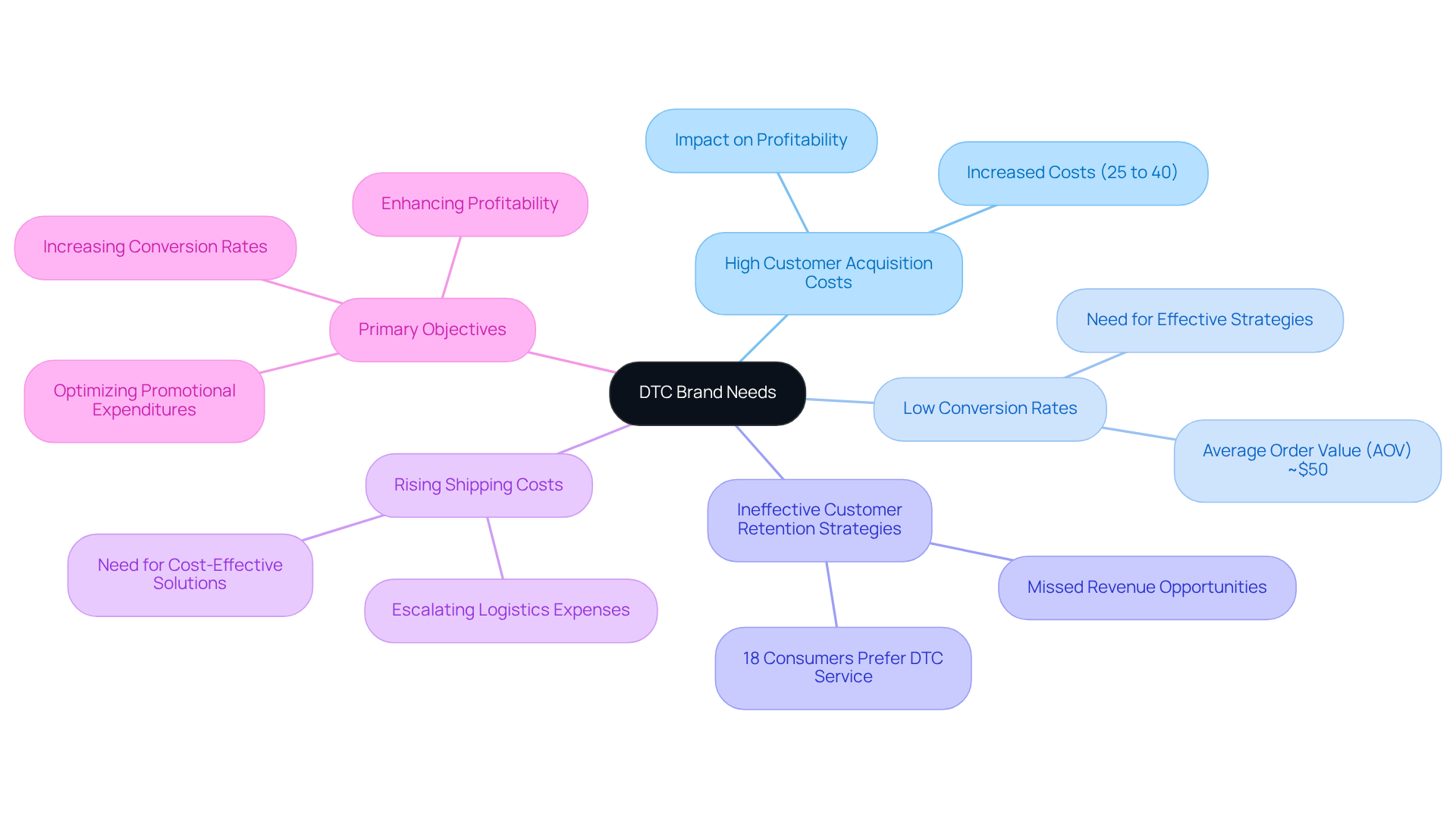
Comparison Criteria: Evaluating Digital Marketing Firms for DTC Brands
When evaluating digital marketing firms, DTC brands must prioritize the following criteria:
- Experience with DTC Brands: Agencies with a proven track record in the DTC sector possess the expertise to navigate the unique challenges and opportunities that arise. For example, firms like Parah Group have demonstrated their competence by achieving a 36% increase in ROI on ads for their clients. Notably, nearly four times as many DTC companies generate over $100M in sales compared to those making under $1 million, underscoring the necessity of selecting agencies with DTC experience.
- Service Offerings: A comprehensive suite of services, including Conversion Rate Optimization (CRO), is essential for digital marketing firms to address the multifaceted nature of digital promotion. DTC companies benefit from agencies that provide user session recordings, competitor analysis, and ongoing A/B testing, ensuring all elements of their marketing approach are aligned for growth. Parah Group employs a holistic strategy that integrates these services to maximize effectiveness.
Digital marketing firms that leverage analytics to inform their strategies can deliver more effective solutions. This approach is particularly crucial as DTC companies face rising customer acquisition costs and intensified competition in the market. It's important to recognize that 10% of eCommerce revenue is allocated to combating payment fraud, highlighting the financial implications of lacking a data-driven strategy.
- Client Testimonials and Case Studies: For digital marketing firms, evidence of past success is indispensable. Brands should seek testimonials that showcase significant increases in revenue per visitor and average order value, as these metrics indicate a firm's ability to drive results. Client testimonials for Parah Group reflect tangible improvements, including enhanced revenue per visitor and diminished reliance on paid advertising.
- Customization and Flexibility: The ability of digital marketing firms to adapt strategies to meet the specific needs of a company is vital for sustained success. Agencies that prioritize sustainable growth and profitability, such as Parah Group, can modify their methodologies to align with the distinct objectives of each DTC company. Furthermore, understanding consumer motivations—such as better pricing and free delivery—can enhance the effectiveness of these tailored strategies.
By concentrating on these criteria, DTC brands can effectively narrow down their options and select a firm that aligns with their strategic objectives.
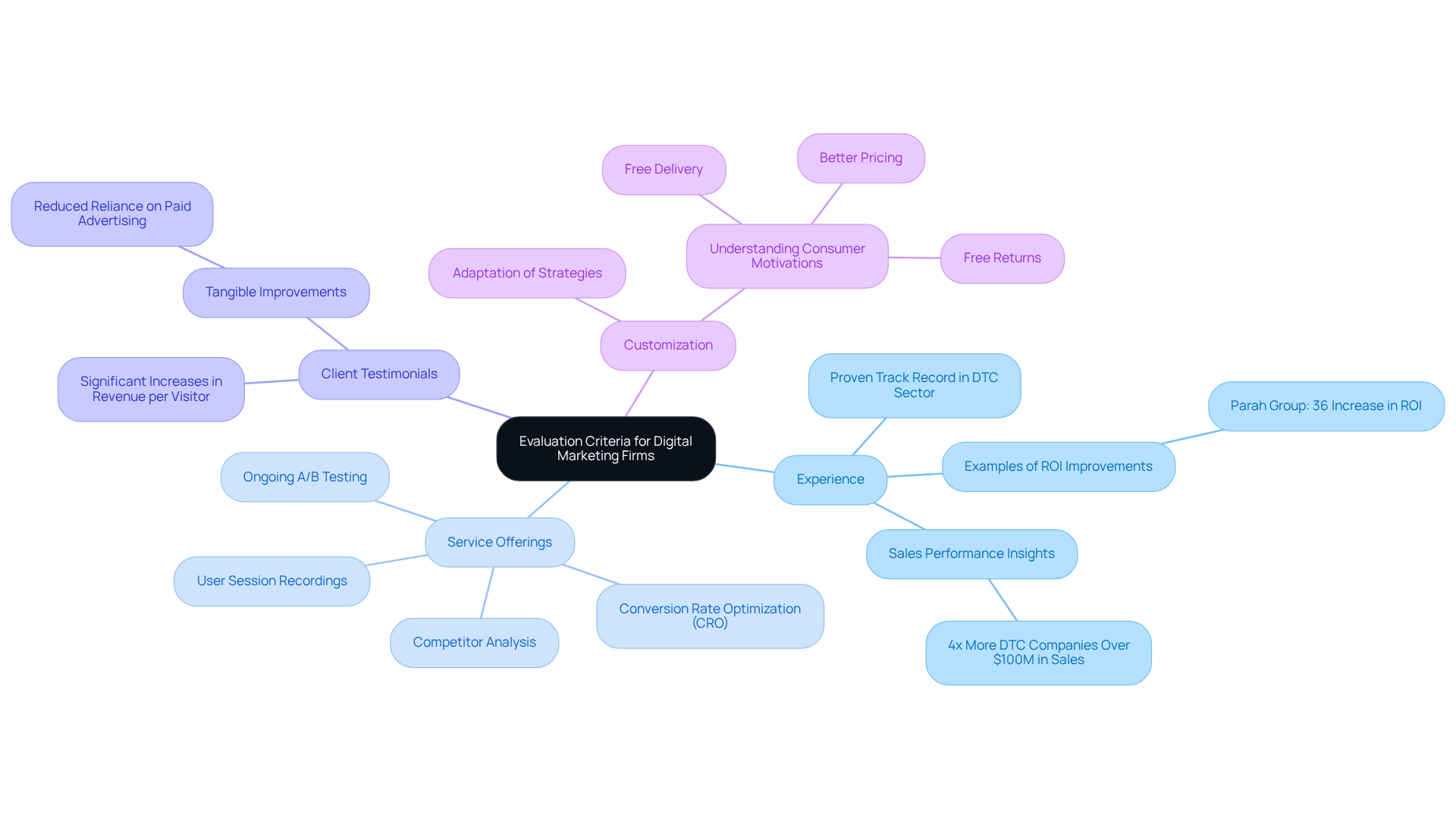
Comparative Analysis of Leading Digital Marketing Firms for DTC Brands
In this comparative analysis, we scrutinize three leading digital marketing firms that cater to direct-to-consumer (DTC) brands:
-
Parah Group: This agency specializes in Conversion Rate Optimization (CRO), employing data-driven approaches and consumer psychology to deliver measurable results. Parah Group has realized notable success, including a 36% increase in ROI on advertisements for clients and significant enhancements in Average Order Value (AOV). Research indicates that effective CRO can lead to a 20-30% increase in conversion rates for DTC brands, underscoring the critical nature of their focus.
- Strengths: Parah Group offers comprehensive CRO services, a proven track record of enhancing profitability, and tailored strategies that align with client goals. Their methodologies consistently lead to measurable improvements in conversion rates and revenue per visitor. Client testimonials highlight significant increases in revenue per visitor, AOV, and conversion rates while reducing reliance on paid advertising.
- Weaknesses: While they excel in CRO, their specialization may limit the breadth of services offered outside this domain.
-
Firm B: This agency, one of the digital marketing firms, provides a broad array of digital marketing services, including SEO and PPC, yet lacks a robust emphasis on CRO.
- Strengths: Firm B boasts diverse service offerings and strong SEO capabilities that can effectively drive traffic to DTC companies.
- Weaknesses: The limited focus on conversion optimization may result in lower ROI for DTC companies, as they may not fully capitalize on existing traffic. Industry specialists indicate that without a comprehensive CRO plan, companies may face [escalating customer acquisition costs](https://thebarcodegroup.com/news/rising-customer-acquisition-costs-are-hurting-dtc-brands-heres-why-its-vital-to-launch-with-an-omnichannel-brand) (CAC) that exceed their average order value (AOV).
-
Firm C: Known for its innovative social media marketing strategies, Firm C has garnered attention for creative campaigns but possesses limited experience with DTC companies compared to other digital marketing firms.
- Strengths: The agency has a strong connection with audiences and employs innovative strategies that resonate with them.
- Weaknesses: Their lack of experience in the DTC space may impede their effectiveness in addressing the specific challenges faced by these companies. Experts note that companies failing to integrate CRO into their strategies may struggle to maintain profitability in a competitive landscape.
This analysis underscores the paramount importance of aligning agency capabilities with the distinct needs of DTC companies, particularly in the realm of , where effective strategies can significantly enhance profitability and customer retention.
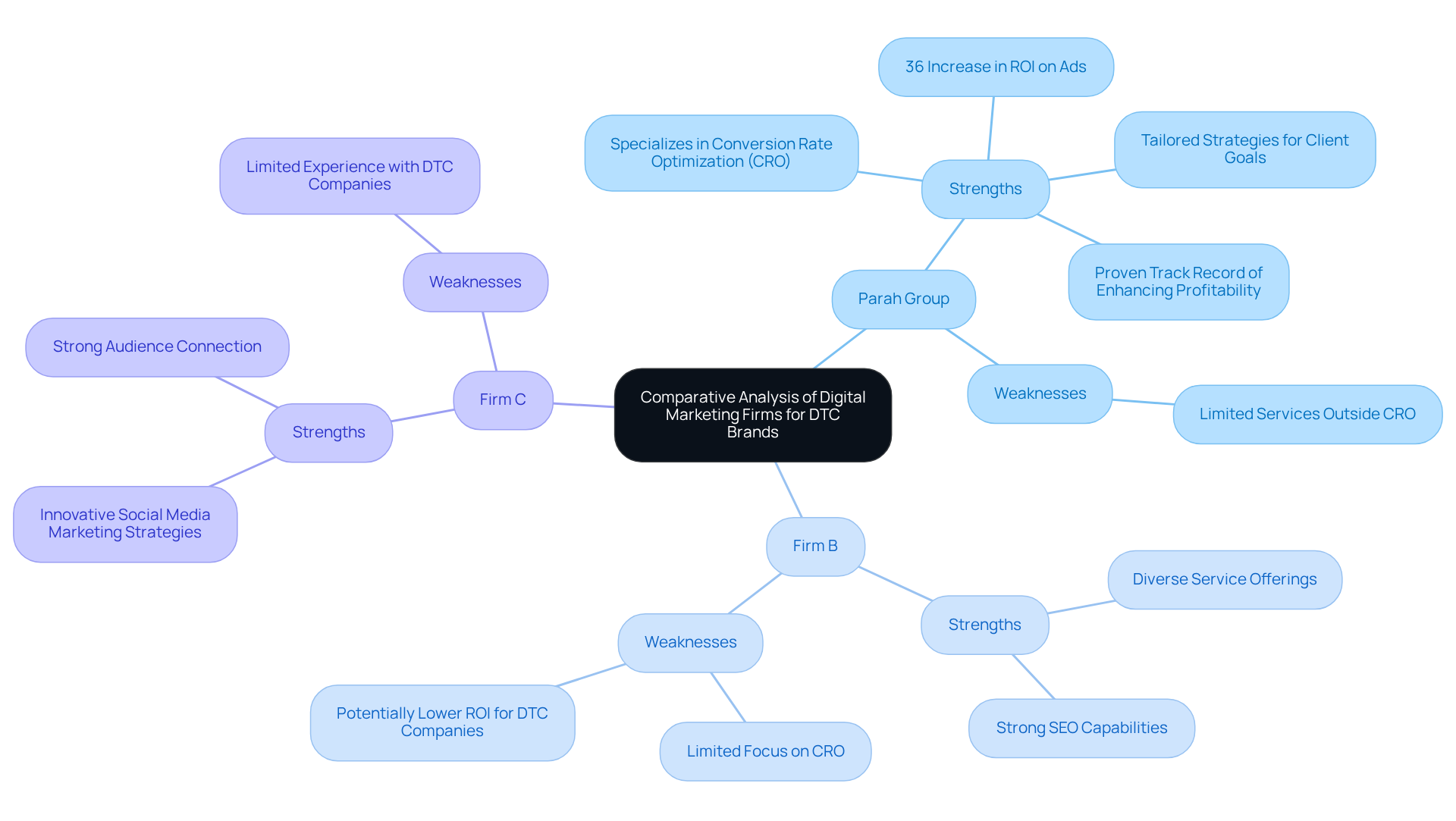
Making the Right Choice: Recommendations for DTC Brands
To make the right choice when selecting a digital marketing firm, DTC brands must prioritize several key factors:
- Prioritize Experience: It is imperative to choose firms with a proven track record in the DTC space, ensuring they comprehend the unique challenges faced by these brands. This importance is underscored by the fact that nearly six in ten Americans purchased from a DTC brand at least once in 2021, highlighting the growing relevance and market potential of DTC brands.
- Evaluate Service Offerings: DTC brands should seek firms that provide a comprehensive suite of services, particularly in Conversion Rate Optimization (CRO), to address various promotional needs. A holistic approach is essential for enhancing customer engagement and driving sales.
- Seek Data-Driven Solutions: Opt for firms that utilize analytics to inform their strategies, ensuring a focus on measurable results. For example, DTC companies have experienced a 14% drop in customer acquisition costs (CAC) due to changes in ad angles, demonstrating the effectiveness of data-driven marketing.
- Consider Client Feedback: It is vital to review testimonials and case studies to gauge past performance and client satisfaction. Successful DTC companies often emphasize their collaborations with agencies that promote transparency and communication, resulting in stronger connections and improved outcomes.
- Evaluate Customization Abilities: Ensure the firm can adapt its strategy to address the specific objectives and challenges of the company. Personalization is becoming increasingly essential, particularly for Gen Z consumers, as DTC companies concentrate on strategies that resonate with their target audiences.
By adhering to these recommendations, DTC companies can significantly enhance their chances of selecting digital marketing firms that drive sustainable growth and profitability. As Kinga Edwards aptly notes, "Direct-to-consumer brands have rewritten the rules of retail with their data-driven, customer-centric approach.
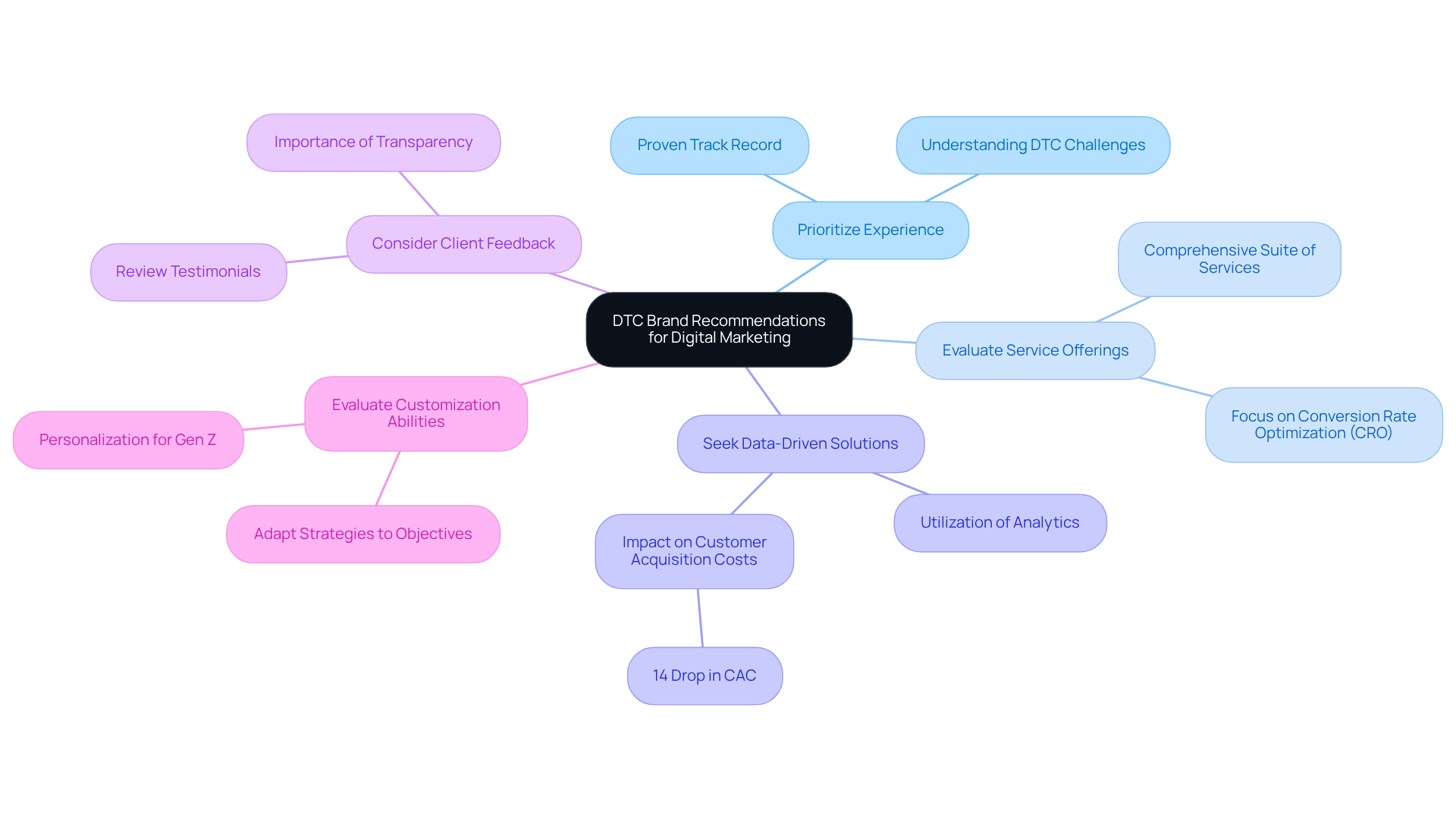
Conclusion
Selecting the right digital marketing firm is not just important; it is crucial for the success of direct-to-consumer (DTC) brands. These firms play a vital role in enhancing online visibility, driving customer engagement, and ultimately increasing conversions. By understanding the unique services offered by these agencies, DTC brands can strategically align their marketing efforts with their growth objectives, effectively navigating the challenges they face in a competitive landscape.
Several key factors warrant consideration when evaluating digital marketing firms:
- The agency's experience with DTC brands is paramount.
- The range of services provided—particularly in areas such as Conversion Rate Optimization (CRO)—is essential.
- The importance of data-driven strategies cannot be overstated.
- The value of client testimonials is significant.
Each of these elements contributes significantly to a firm's capacity to deliver tailored solutions that yield measurable results, addressing the specific needs and goals of DTC companies.
In conclusion, DTC brands must prioritize a meticulous evaluation process when selecting digital marketing partners. By focusing on agencies that demonstrate expertise in the DTC sector and offer comprehensive, customizable services, brands can markedly enhance their prospects for sustainable growth and profitability. Embracing a data-driven, customer-centric approach will not only assist in navigating current challenges but also position DTC brands for long-term success in an ever-evolving market.
Frequently Asked Questions
What are the main roles of digital marketing firms for DTC brands?
Digital marketing firms provide essential services such as Search Engine Optimization (SEO), Pay-Per-Click Advertising (PPC), Social Media Marketing, Content Marketing, and Conversion Rate Optimization (CRO) to enhance online visibility, engagement, and conversion rates for DTC brands.
What is Search Engine Optimization (SEO)?
SEO involves elevating a website's visibility on search engines to attract organic traffic, helping DTC brands reach more potential customers.
How does Pay-Per-Click Advertising (PPC) benefit DTC brands?
PPC manages paid advertising campaigns to effectively drive targeted traffic to DTC brands' websites, increasing the chances of conversion.
Why is Social Media Marketing important for DTC brands?
Social Media Marketing engages customers on social platforms, cultivating loyalty and brand awareness, which are vital for DTC brand growth.
What is the purpose of Content Marketing?
Content Marketing develops valuable content aimed at attracting and retaining a clearly defined audience, which can lead to increased customer engagement and conversions.
What does Conversion Rate Optimization (CRO) entail?
CRO involves implementing strategies to boost the percentage of website visitors who complete desired actions, such as making a purchase.
What challenges do DTC brands face regarding customer acquisition?
DTC brands often encounter high customer acquisition costs, which have surged by 25% to 40% across various channels, posing significant obstacles to profitability.
What issue do DTC brands face with conversion rates?
Many DTC companies struggle with low conversion rates, impacting profitability, with an average order value (AOV) around $50, necessitating effective strategies to improve this metric.
How do customer retention strategies affect DTC brands?
Ineffective customer retention strategies can lead to missed revenue opportunities, as many brands underestimate the importance of keeping existing customers.
What impact do rising shipping costs have on DTC brands?
Rising shipping costs can deter potential purchasers, prompting DTC brands to seek cost-effective shipping solutions and flexible fulfillment models to address these challenges.
What are the primary objectives of DTC companies?
The primary objectives typically include enhancing profitability, increasing conversion rates, and optimizing promotional expenditures to foster growth and success.
What is emphasized as a core requirement for sustaining international growth by 2025?
Agility, particularly in fulfillment and compliance, is emphasized as a core requirement for sustaining international growth by 2025, according to Casey Bright, Senior Director & Head of Marketing at Passport.
FAQs











